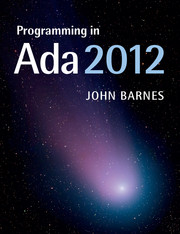Summary
The final major topic to be introduced is tasking. Ada is fairly unusual in having tasking constructions built in to the language. Some might argue that such matters are the concern of the operating system and are better done by calls from an otherwise sequential program. However, built-in constructions provide greater reliability; general operating systems do not provide the control and timing needed by many applications; and every operating system is different. Building tasking into the language also makes it easier to benefit from any parallelism in the machine and increases the potential for optimization.
This chapter concentrates on the key ideas. Further examples and details especially concerning the interaction between tasking and OOP are dealt with in Chapter 22 which also covers important facilities concerning timing which are actually defined in the Real-Time Systems annex.
Parallelism
So far we have only considered sequential programs in which statements are obeyed in order. In many applications it is convenient to write a program as several parallel activities which cooperate as necessary. This is particularly true of programs which interact in real time with physical processes in the real world, simulation programs (which mimic parallel activities in the real world), and programs which wish to exploit multiprocessor architectures directly.
In Ada, parallel activities are defined by means of tasks. A task is lexically described by a form very similar to a package.
- Type
- Chapter
- Information
- Programming in Ada 2012 , pp. 501 - 550Publisher: Cambridge University PressPrint publication year: 2014

